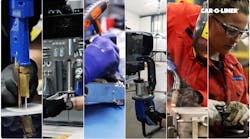While CAPA has demonstrated that the car companies can produce their service parts with different material than what they used in the assembly part, the CAPA program ensures that the material used in a CAPA-certified part is the same as the material used in a car company service part.
"In addition, CAPA requires that a CAPA-certified part stay current with any modifications that the car company may make in materials or other part characteristics," said Jack Gillis, CAPA executive director. "That's a basic tenet of the CAPA program and one of the reasons why CAPA insists on rigorous re-inspection of the parts in the CAPA program."
CAPA requires that aftermarket parts undergo extensive material testing at the outset of CAPA certification as well as randomly through the life of the part. Clearly, the market assumes that when a car company puts a service part in the market, the part is appropriate for use. Because of this, CAPA certification requires that both the aftermarket part and the car company service counterpart undergo extensive comparative testing.
Ford indicated that it would have been informative if the "aftermarket polystyrene isolator had been tested and compared to the Ford polypropylene isolators." CAPA said it agrees that the use of comparable materials is crucial to comparable part performance. During the research and development of its CAPA 501 Bumper Parts Standard, CAPA performed comparative crash testing on a non-CAPA Certified aftermarket energy absorber and a Ford energy absorber for the 2006-2009 Fusion. The aftermarket part was clearly marked that it was made of the same material as the Ford brand part. However, CAPA testing found that the aftermarket part was actually made of a completely different plastic and performed dramatically differently than the Ford brand part during impact. In fact, it exploded to pieces.
A comparative video of the crash test is available.
In spite of the widespread notification of this seriously defective part, it still remains on the market from U.S. part distributors and shops continue to place the part on vehicles, CAPA said.
"As the exploding bumper indicates, it is impossible to determine the quality of an aftermarket part just by looking at it or even reading the material information stamped in by the manufacturer," said Gillis. "This is why CAPA Certification is so important. CAPA takes the "guess or hope" factor away for shops, consumers, and insurers. CAPA's approach is simple: We certify comparability on a part by part basis that's why the yellow and blue CAPA Quality Seal has come to represent the highest level of aftermarket part quality."
For more information see www.CAPAcertified.org.

